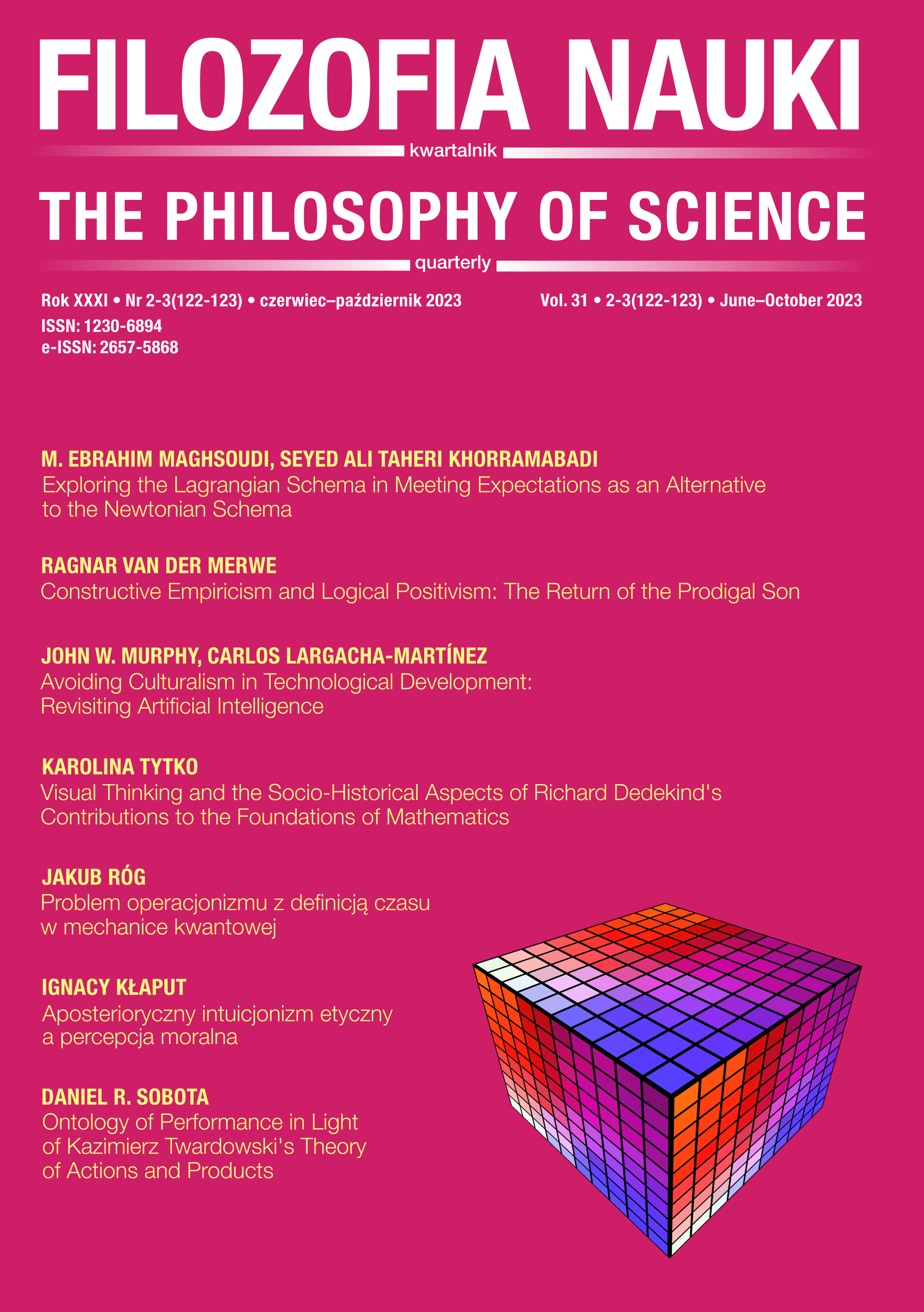Avoiding Culturalism in Technological Development: Revisiting Artificial Intelligence
DOI:
https://doi.org/10.14394/filnau.2023.0004Słowa kluczowe:
non-dualism, participatory AI-development, phenomenology, algorithmsAbstrakt
AI-developers face a challenge when seeking to use models that aim to be culturally sensitive. While we agree that culture is an emergent reality, there is always the risk of creating algorithms that treat culture as objective to account for various facets of the social realm. As a result, culture becomes prepackaged and autonomous. Nonetheless, culture is not only emergent but dialogically and socially invented. In this article, the point is to advance the discussion about culture by addressing a crucial philosophical issue and proposing some practical themes on how to avoid culturalism in AI development.
Bibliografia
Aggarwal G. (2021), “How Humans-in-the-Loop-AI can Help Solve the Data Problem,” Forbes October 2021, https://www.forbes.com/sites/forbestechcouncil/2021/10/27/how-humans-in-the-loop-ai-can-help-solve-the-data-problem/?sh=6454071448b6 [retrieved March 19, 2023].
Bakewell S. (2016), At the Existentialist Café, New York: Other Press. https://doi.org/10.17104/9783406697654
Bender E. M. and Koller A. (2020), “Climbing toward NLU: On Meaning, Form, and Understanding in the Age of Data,” Proceedings of the 58th Annual Meeting of the Association of Computational Linguistics, 5185–5198, aclanthology.org/2020.acl-main.463.pdf [retrieved March 19, 2023]. https://doi.org/10.18653/v1/2020.acl-main.463
Bordo S. (1987), The Flight to Objectivity, Albany, NY: SUNY Press.
Bourdieu P. (1990), In Other Words, Stanford, CA: Stanford University Press. https://doi.org/10.1515/9781503621558
Crawford K. (2021), The Atlas of AI, New Haven: Yale University Press.
Cwikel J. G. (2006), Social Epidemiology, New York: Columbia University Press.
Dirlik A. (1987), “Culturalism as Hegemonic Ideology and Liberating Practice,” Cultural Critique 6: 13–50. https://doi.org/10.2307/1354254
Feigenbaum E. A. (2003), “Some Challenges and Grand Challenges for Computational Intelligence,” Journal of the AMC 50(1): 32–40. https://doi.org/10.1145/602382.602400
Gadamer H.-G. (1989), Truth and Method, New York: Crossroad.
Grayling A. C. (2019), The History of Philosophy, New York: Penguin Press.
Guszcza J. (2018), “AI Needs Human-Centered Design,” Wire http://wired.com/brandlab/2018/05/ai-needs-human-centered-design/?mbid=email onsiteshare [retrieved on June 27, 2021].
Heidegger M. (1962), Being and Time, New York: Harper and Row.
Horkheimer M. and Adorno T. W. (1972), Dialectic of Enlightenment, New York: Continuum.
Husserl E. (1964), The Paris Lectures, The Hague: Nijhoff. https://doi.org/10.1007/978-94-017-5926-7
Ihde D. (1990), Technology and the Lifeworld: From Garden to Earth, Bloomington: Indiana University Press.
Kleinman A. (1978), “Concepts and a Model for the Comparison of Medical Systems as Cultural Systems,” Social Science and Medicine 12(2-B): 85–93. https://compass.onlinelibrary.wiley.com/doi/pdf/10.1111/soc4.12851 [retrieved March 19, 2023]. https://doi.org/10.1016/0160-7987(78)90014-5
Liu Z. (2021), “Sociological Perspectives on Artificial Intelligence: A Typological Reading,” Sociology Compass 15(3): e12851. https://doi.org/10.1111/soc4.12851
Merleau-Ponty M. (1968), The Visible and the Invisible, Evanston, IL: Northwestern University Press.
Ornelas M. L., Smith G. B., and Mansouri M. (2022), “Redefining Culture in Cultural Robotics,” AI and Society. https://doi.org/10.1007/s00146-022-01476-1
Pollner M. (1987), Mundane Reason, New York: Cambridge University Press.
Power R. (2023), “No Black Boxes: Keep Humans Involved in Artificial Intelligence,” Forbes, https://www.forbes.com/sites/rhettpower/2023/01/15/no-black-boxes-keep-humans-involved-in-artif icial-intelligence/?sh=3601be9674fa [retrieved March 12, 2023].
Robinson W. S. (2018), “Dualism” [in:] The Routledge Handbook of Consciousness, R. J. Gennaro (ed.), London: Routledge, 51–63. https://doi.org/10.4324/9781315676982-5
Shneidermann B. (2022), Human-Centric AI, Oxford: Oxford University Press. https://doi.org/10.1093/oso/9780192845290.001.0001
Schutz A. (1962), Collected Papers, vol. I, The Hague: Nijhoff.
Simon H. A. (1981), The Sciences of the Artificial, Cambridge, MA: MIT Press.
Winograd T. and Flores F. (1986), Understanding Computers and Cognition: A New Foundation for Design, Norwood, NJ: Ablex.
Winograd T. (2006), “Shifting Viewpoints: Artificial Intelligence and Human–Computer Interaction,” Artificial Intelligence 170(18): 1256–1258. https://doi.org/10.1016/j.artint.2006.10.011
Wittgenstein L. (1992), Philosophical Investigations, Oxford, UK: Blackwell.
Wrong D. (1961), “The Oversocialized Conception of Man in Modern Sociology,” American Sociological Review 26(2): 183–193. https://doi.org/10.2307/2089854
Xu W. (2019), “Toward Human-Centered AI: A Perspective from Human–Computer Interaction,” Interactions 26(4): 42–46. https://doi.org/10.1145/3328485
Pobrania
Opublikowane
Jak cytować
Numer
Dział
Licencja
Prawa autorskie (c) 2023 John W. Murphy, Carlos Largacha-Martínez

Utwór dostępny jest na licencji Creative Commons Uznanie autorstwa – Użycie niekomercyjne – Bez utworów zależnych 4.0 Międzynarodowe.



















 Filozofia Nauki | ISSN 1230-6894 | e-ISSN 2657-5868
Filozofia Nauki | ISSN 1230-6894 | e-ISSN 2657-5868